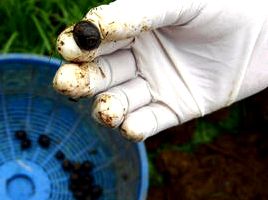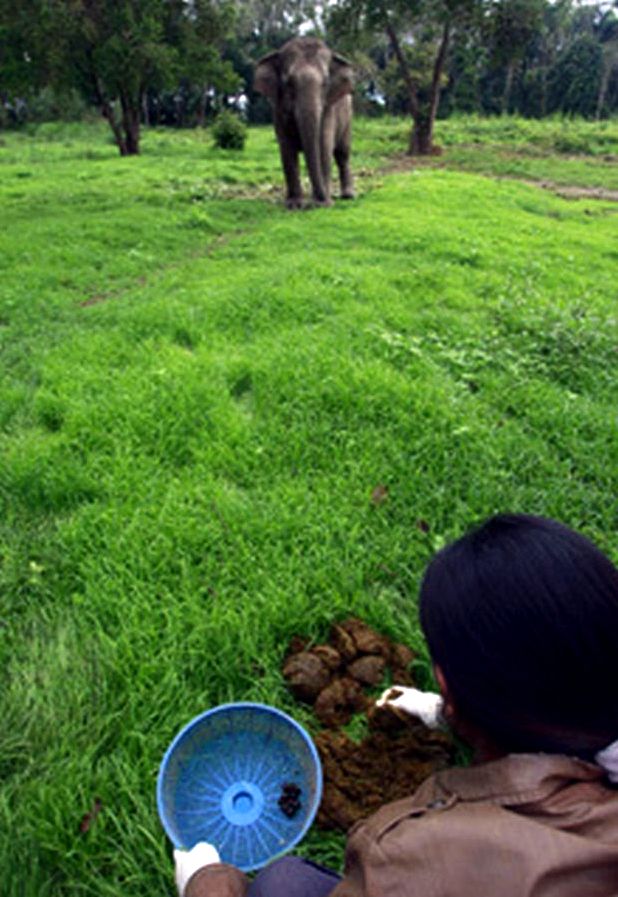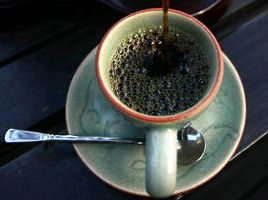GOLDEN Triangular, Thailand Within the lush hillsides of northern Thailand, a herd of 20 tigers helps to excrete a few of the world’s most costly coffee.
Trumpeted as earthy in flavor and smooth around the palate, the exotic new brew is made of beans eaten by Thai tigers and plucked each day later using their dung. A gut reaction within the elephant creates what its founder calls the coffee’s unique taste.
Stomach turning or oddly alluring, this isn’t one of the earth’s most unusual niche coffees. At $1,100 per kilogram ($500 per pound), it is also one of the world’s priciest.
 A beans is selected from elephant dung in an elephant camp in Chiang Rai province, northern Thailand.
A beans is selected from elephant dung in an elephant camp in Chiang Rai province, northern Thailand.
AP Photo/Apichart Weerawong
For the time being, just the wealthy or well-traveled have the cuppa, that is known as Black Ivory Coffee. It had been launched recently in a couple of luxury hotels in remote corners around the globe first in northern Thailand, then your The maldives and today Abu Dhabi using the cost tag of approximately $50 an amount.
The Connected Press traveled towards the coffee’s production site within the Golden Triangular, a place in the past noted for producing drugs stronger than coffee, to determine the jumbo baristas at the office. And also to sip the end product from the dainty demi-tasse.
"When an elephant eats coffee, its stomach acidity breaks lower the protein present in coffee, that is a main factor in bitterness," stated Blake Dinkin, that has spent $300,000 developing the coffee. "You finish track of just one cup that’s very smooth with no bitterness of standard coffee."
Within the misty mountain tops where Thailand meets Laos and Myanmar, the coffee’s creator cites biology and research to reply to the fundamental question: Why tigers?
 A Thai mahout’s wife picks espresso beans from elephant dung in a camp in Chiang Rai province, northern Thailand.
A Thai mahout’s wife picks espresso beans from elephant dung in a camp in Chiang Rai province, northern Thailand.
AP Photo/Apichart Weerawong
It makes sense similar in civet coffee, or Kopi Luwak, another exorbitantly costly variety obtained from the excrement from the weasel-like civet. However the elephants’ massive stomach supplies a bonus.
Consider the elephant because the animal kingdom’s same as a sluggish oven. It requires between 15-30 hrs to digest the beans, which stew along with bananas, sugar cane along with other ingredients within the elephant’s vegetarian diet to infuse unique earthy and fruity flavors, stated the 42-year-old Canadian, with a background in civet coffee.
"My theory is the fact that an all natural fermentation process happens within the elephant’s gut," stated Dinkin. "That fermentation imparts flavors you would not receive from other coffees."
In the jungle retreat that hosts the herd, conservationists were initially skeptical concerning the idea.
"My primary thought involved caffeine will not the tigers get wired onto it or hooked on coffee?" stated John Roberts, director of tigers in the Golden Triangular Asian Elephant Foundation, a refuge for saved tigers. It now earns 8 percent from the coffee’s total sales, which are toward the herd’s healthcare. "So far as we are able to tell there’s certainly no injury to the tigers."
Before presenting his proposal towards the foundation, Dinkin stated he labored having a Canadian-based vet that ran bloodstream tests on zoo tigers showing they do not absorb any caffeine from eating raw coffee cherries.
"I believed it was really worth a go because we are searching for anything that will help tigers to create a living," stated Roberts, who estimates the price of keeping each elephant is all about $1,000 per month.
 An costly cuppa joe: Black Ivory coffee, costing $1,100 per kilogram, is put right into a cup in a hotel restaurant in Chiang Rai province, northern Thailand.
An costly cuppa joe: Black Ivory coffee, costing $1,100 per kilogram, is put right into a cup in a hotel restaurant in Chiang Rai province, northern Thailand.
AP Photo/Apichart Weerawong
When it comes to coffee’s inflated cost, Dinkin half-joked that tigers are highly inefficient workers. It requires 36 pounds of raw coffee cherries to create 1 pound of Black Ivory coffee. Nearly all beans get chewed up, damaged or lost in tall grass after being passed.
And, his artisinal process is labor intensive. He makes use of pure Arabica beans hands-selected by hill-tribe women from the small mountain estate. When the tigers do their business, the spouses of elephant mahouts collect the dung, break it open and choose the coffee. Following a thorough washing, the coffee cherries are processed to extract the beans, that are then introduced to some gourmet roaster in Bangkok.
Inevitably, the elephant coffee is just about the butt of jokes. Dinkin shared his favorites: Crap-accino. Best to the final shedding. Elephant poop coffee.
As a long way away as Hollywood, even Jay Leno has had cracks.
"Here’s my question," Leno quipped lately. "Who’s the very first person who saw a lot of espresso beans along with a pile of elephant dung and stated, "You realize, basically ground individuals up and drank it, I’m sure that might be scrumptious."
Resourse: http://cbsnews.com/news/exotic-coffee-beans-plucked-from-elephant-dung/
Expensive espresso: Thailand's elephant dung coffee
Video COMMENTS:
Nite Explorer: after seeing this i want to shot myself